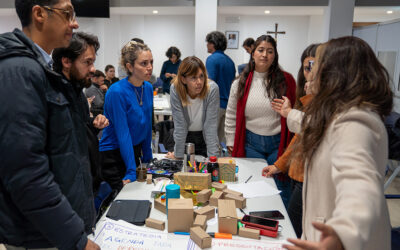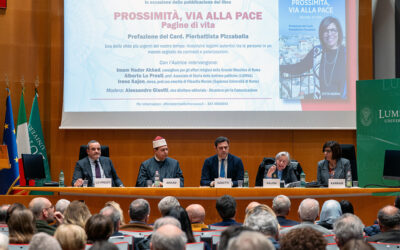 On 8 November 2012, members of Reformed and Free Churches, Methodists and Catholics, ecumenical personalities, pastors, priests, pastoral assistants and members of several movements from the different linguistic regions of Switzerland – 250 people beyond what was expected – crowded into a hall at the Kreuz Hotel in Berne. They had come to attend an ecumenical symposium organized by the Focolare Movement entitled “Ecumenism: Where is it going?” The speakers were three special guests: a Cardinal, a lay woman and a Reformed pastor. They were Swiss Cardinal Koch who came from the Vatican and is now president of the Pontifical Council for Promoting Christian Unity; the president of the Federation of the Protestant Churches of Switzerland, Gottfried Locher and, to do the honours, Maria Voce, president of the Focolare Movement. In their presentations the speakers explored various aspects of the ecumenical process with a strong common belief that the ecumenical process is by now irreversable indispensable despite the signs of fatigue that sometimes characterize it and make it seem like a mission impossible. “As long as we fight for unity,” the future president of the work Community of Christian Churches in Switzerland, Rita Famos, affirmed, “we are on the right path. It means that we haven’t laid down our arms. Today we want to stimulate dialogue between those who dream with hope and those who struggle for unity.” In fact, one of the “dangers” in the ecumenical journey is that of “getting used to the differences in thinking, and imagining that we are just fine without the other Church,” Locher warned. Maybe “we got comfortable,” we no longer find the “division to be scandalous.” Hence his call to “construct unity wherever it is now possible,” to step out of the Cantonal Reformed Churches that are often very independant from one another, in order to find more communion and a common voice, a common message of the Swiss Reformed Church in these important times. He gave strong and constant reminders of the transforming power of the Word.
On 8 November 2012, members of Reformed and Free Churches, Methodists and Catholics, ecumenical personalities, pastors, priests, pastoral assistants and members of several movements from the different linguistic regions of Switzerland – 250 people beyond what was expected – crowded into a hall at the Kreuz Hotel in Berne. They had come to attend an ecumenical symposium organized by the Focolare Movement entitled “Ecumenism: Where is it going?” The speakers were three special guests: a Cardinal, a lay woman and a Reformed pastor. They were Swiss Cardinal Koch who came from the Vatican and is now president of the Pontifical Council for Promoting Christian Unity; the president of the Federation of the Protestant Churches of Switzerland, Gottfried Locher and, to do the honours, Maria Voce, president of the Focolare Movement. In their presentations the speakers explored various aspects of the ecumenical process with a strong common belief that the ecumenical process is by now irreversable indispensable despite the signs of fatigue that sometimes characterize it and make it seem like a mission impossible. “As long as we fight for unity,” the future president of the work Community of Christian Churches in Switzerland, Rita Famos, affirmed, “we are on the right path. It means that we haven’t laid down our arms. Today we want to stimulate dialogue between those who dream with hope and those who struggle for unity.” In fact, one of the “dangers” in the ecumenical journey is that of “getting used to the differences in thinking, and imagining that we are just fine without the other Church,” Locher warned. Maybe “we got comfortable,” we no longer find the “division to be scandalous.” Hence his call to “construct unity wherever it is now possible,” to step out of the Cantonal Reformed Churches that are often very independant from one another, in order to find more communion and a common voice, a common message of the Swiss Reformed Church in these important times. He gave strong and constant reminders of the transforming power of the Word.  Many were involved in this process that saw moments of enthusiasm and moments of stalling. Among them the Pope, as Cardinal Koch recalled when he pointed to the ecumenical passion that led the John XXIII to create the Secretariat for the Promotion of Christian Unity in 1960. This institutite over which Koch presides also witnessed how close Paul VI was to the Orthodox world of Constantinople and the cancellation of the mutual anathemas that had “expelled the poison of excommunication” after 900 years. It also also brought Paul VI to meet with Anglican Primate Ramsey. Then there was John Paul II with his concrete acts of ecumenism, until Benedict XVI who in his first message stated his desire to work with all of his strength for the unity of Christians. But there is not only the ecumenism promoted by Church leaders, nor even the ecumenism that is brought forward by theologians. There is also a vital ecumenism based on an ecumenism of life, an ecumenism of people. And this is the ecumenism that Maria Voce spoke about. She recounted the experience of adults and children from different countries who have discovered the main points of Focolare spirituality to be very ecumenical when they lived it, especially for the accent it places on the Word, faith in Jesus’ promise to be there “wherever two or more are united” in His Name (Mt. 18:20), love for Jesus Crucified and Abandoned, who is the symbol of every disunity. And this spirituality has opened fields of dialogue among Christians of different Churches (350 at the moment) who find in one point after another reflections of their own creeds. “It is an ecumenism from below that is not opposed to the one above. It is a kind of dialogue that can serve as the humus, upon which the other dialogues can blossom and develop,” the president of the Focolare affirmed.
Many were involved in this process that saw moments of enthusiasm and moments of stalling. Among them the Pope, as Cardinal Koch recalled when he pointed to the ecumenical passion that led the John XXIII to create the Secretariat for the Promotion of Christian Unity in 1960. This institutite over which Koch presides also witnessed how close Paul VI was to the Orthodox world of Constantinople and the cancellation of the mutual anathemas that had “expelled the poison of excommunication” after 900 years. It also also brought Paul VI to meet with Anglican Primate Ramsey. Then there was John Paul II with his concrete acts of ecumenism, until Benedict XVI who in his first message stated his desire to work with all of his strength for the unity of Christians. But there is not only the ecumenism promoted by Church leaders, nor even the ecumenism that is brought forward by theologians. There is also a vital ecumenism based on an ecumenism of life, an ecumenism of people. And this is the ecumenism that Maria Voce spoke about. She recounted the experience of adults and children from different countries who have discovered the main points of Focolare spirituality to be very ecumenical when they lived it, especially for the accent it places on the Word, faith in Jesus’ promise to be there “wherever two or more are united” in His Name (Mt. 18:20), love for Jesus Crucified and Abandoned, who is the symbol of every disunity. And this spirituality has opened fields of dialogue among Christians of different Churches (350 at the moment) who find in one point after another reflections of their own creeds. “It is an ecumenism from below that is not opposed to the one above. It is a kind of dialogue that can serve as the humus, upon which the other dialogues can blossom and develop,” the president of the Focolare affirmed.  There are already many types of dialogue that already exist among Churches,on different levels and reaching different levels. And the difficulties that are never lacking often make the goal of Jesus’ Testament seem a faraway dream. At times lose the trail, we drift apart rather than draw closer together. It was recalled in the hall that in his prayer, Jesus did not command unity. He asked it of the Father. What we Christians are called to do, therefore, is to collaborate with patience and fervour, but unity is a gift of God that we must pray for together. Just as we must feel the pain of our division together, acknowledge the fault of our disunity together, so too must we work together so that “all may be one.” An evermore secularized society requires the witness and the commitment of a united Christianity. This is also something we all agree on. By Aurora Nicosia (Source: Città Nuova online)
There are already many types of dialogue that already exist among Churches,on different levels and reaching different levels. And the difficulties that are never lacking often make the goal of Jesus’ Testament seem a faraway dream. At times lose the trail, we drift apart rather than draw closer together. It was recalled in the hall that in his prayer, Jesus did not command unity. He asked it of the Father. What we Christians are called to do, therefore, is to collaborate with patience and fervour, but unity is a gift of God that we must pray for together. Just as we must feel the pain of our division together, acknowledge the fault of our disunity together, so too must we work together so that “all may be one.” An evermore secularized society requires the witness and the commitment of a united Christianity. This is also something we all agree on. By Aurora Nicosia (Source: Città Nuova online)
Give with joy
Give with joy




0 Comments